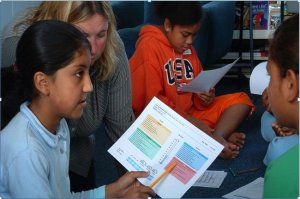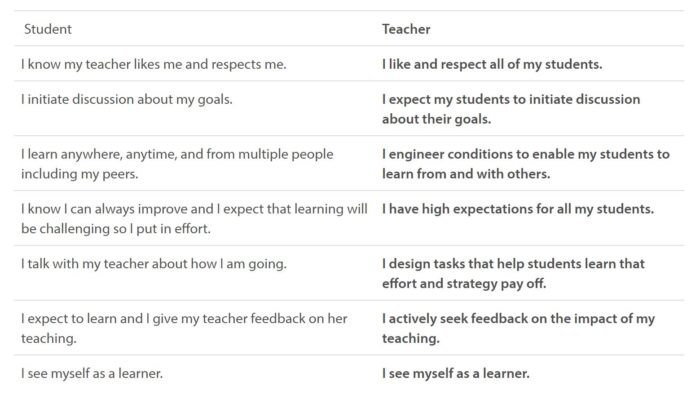Assessment in the service of learning
By Mary Chamberlain on April 22, 2014 in Assessment for learning
Mary Chamberlain reports from the International Symposium on Classroom Assessment 2014.
In schools where assessment is being used in the service of learning we are seeing devolution of power. Responsibility for learning is being shared with learners. Creating the conditions that enable students to take shared responsibility for their learning is important because students who are immersed in highly-structured learning environments dominated by direct instruction and summative assessments often find it difficult to engage in ongoing learning.
Highly structured teaching that breaks learning into tiny pieces is a bit like paint by numbers. Some of you may have been given a paint by numbers set when you were young. There was a nice scene on the lid of the box and inside the box there was a white piece of paper covered in lots of small numbered shapes. The instructions said “paint all the 1s blue, all the 2s red” and so on. Essentially your task was to neatly put the right colours in the right places, without being messy and without painting over the lines.
Paint by numbers over-simplified teaching is not respectful towards students, teachers or important learning concepts. If students are taught in formulaic ways the learning process disappears. Contrast this that with the Stonefields School approach shown in the following video clip. I would argue that at Stonefields School assessment is clearly being used in the service of learning. Have a look and see if you can see why I say that.
To ensure a high performing system, the excellent practice illustrated in the video needs to be mirrored across the whole system. Everybody in the system needs to be learners. Why would anyone want a system where only some people are learners? Teachers set conditions for students to learn, so in the same way leaders should set conditions for teachers to learn and administrators and policy makers should set conditions for schools and school leaders to learn.
We therefore need to think about what good “assessment in the service of learning” looks like not only for students, but for teachers, leaders, administrators and policy makers. So what might we be likely to see in a system where assessment operated in the service of learning? I propose five areas for discussion. I will illustrate each point at classroom level, but each of these points is equally applicable to teacher, leader and policy maker levels.
The first thing I would expect to see if assessment was being used in the service of learning would be learning pathways that are visible to all. There would be clarity and agreement on the most valuable things all children should know and be able to do by the time they leave school and visible and understandable learning pathways would be readily available and accessible for students and for all who support their learning – teachers, parents and wider community.

The pathways might be expressed as concept maps, progressions, standards, rubrics or exemplars. However they are expressed, the point is that everyone would know what good progress looked like, and the pathways would be used in ways that support student agency. Students would use the pathways as a source of information to help them notice, recognise and respond to the question- how am I going with my learning and what might I focus on next?
The second thing I would expect to see if a system was using assessment in the service of learning is that every learner would be working towards explicit and appropriately challenging improvement goals or targets. Every learner would have something tangible to aim for. Every learner would clearly understand what she is learning, what it will mean for her when they have learnt it and what her next learning focus might be. If students don’t know why they are doing something, they won’t be effective learners.
When learners really understand what they are aiming for they will initiate their assessments, rather than the teacher. Learners will be saying things like – I think I’ve achieved my goal now, and I would like an assessment to check. Learners would get the results of their assessments immediately and they would use them to inform what they needed to learn next.
The third thing is something I would not expect to see. I would not expect to see students waiting for a teacher to tell them what to do next.

If assessment is being used in the service of learning each student will have a growth mindset. They will believe that learning takes time and effort and that if they invest time and effort they will improve. Teachers’ feedback will help strengthen students’ growth mindset.
For example, if a child completed some maths tasks quickly and easily- you would not hear a teacher say good boy or clever girl, they would be more likely to say, “Oh I’m sorry I’ve wasted your time by giving you a task that was too easy for you, let’s find something more challenging.”
I would also expect to see students working with their peers and other people. They would be learning through and with a broad personal learning network that was both physical and virtual. Recent studies all point in the same direction – peers working together in small and collaborative groups outperform even the most highly motivated individuals. As Vygotsky pointed out all those years ago, we all construct our own meaning, but what we can learn on our own is limited when compared to what we can learn with someone else.
My fourth point is that in a system where assessment is being used in the service of learning teachers would be sitting with students, eliciting students’ ideas and deliberately building on them. When engaging with students’ ideas teachers will understand that students have many different reference points.
A teacher’s skilful discussion with a student could elicit:
information about students’ interests and goals,
their views about what the teacher expects,
the level of support they give to and receive from other students, and
how they see themselves as learners.
My fifth and final point is that that where assessment is being used in the service of learning students will deeply understand their role as a learner and their teacher’s role as a teacher. Teachers and students will be engaged in learning-focused relationships where they monitor each other. They will provide encouragement to each other when times are tough for learning or teaching, and they will provide recognition and celebration for each other when it has gone well.

Teachers will know when all of their students see themselves as learners because even the students who currently try to stay invisible will be relaxed about advocating for their own needs when they need to. They may ask other students to work more quietly, or they may ask the teacher to explain something again.
I’ve talked about five points with a focus on students. I suggest that if assessment is really being used in the service of learning we will see these points being modelled and enacted at all levels:
There will be clear learning pathways for students, teachers, leaders and policy makers and these will be visible to all.
Every learner (students, teachers, leaders and policy makers) will be working towards explicit and appropriately challenging improvement goals or targets.
Teachers will be eliciting students’ ideas and deliberately building on them, leaders will be listening to teachers’ ideas and policy makers will be listening to leaders’, teachers’ and students’ ideas.
Students will not be waiting for a teacher to tell them what to do next and in the same way teachers, leaders and policy makers will exhibit agency in their daily work.
Students will deeply understand their roles as learners and their teachers’ roles as teachers; in the same way teachers, leaders and policy makers will deeply understand their own and each other’s roles in using assessment to support students’ learning.
If you have any questions about this article
Other articles you might like
It’s Monday afternoon and teachers are slowly and begrudgingly making their way to the staff room for the fortnightly “PD session”.
“You don’t have to be frightened about learning. You just have to be prepared to ask lots of questions . . . to find out what you don’t know. I like helping the others too . . .” Derek – Year 6 ‘priority learner’
Schools are increasingly focused on placing their learners at the centre. And there is plenty of research that tell us this is a very good thing!
